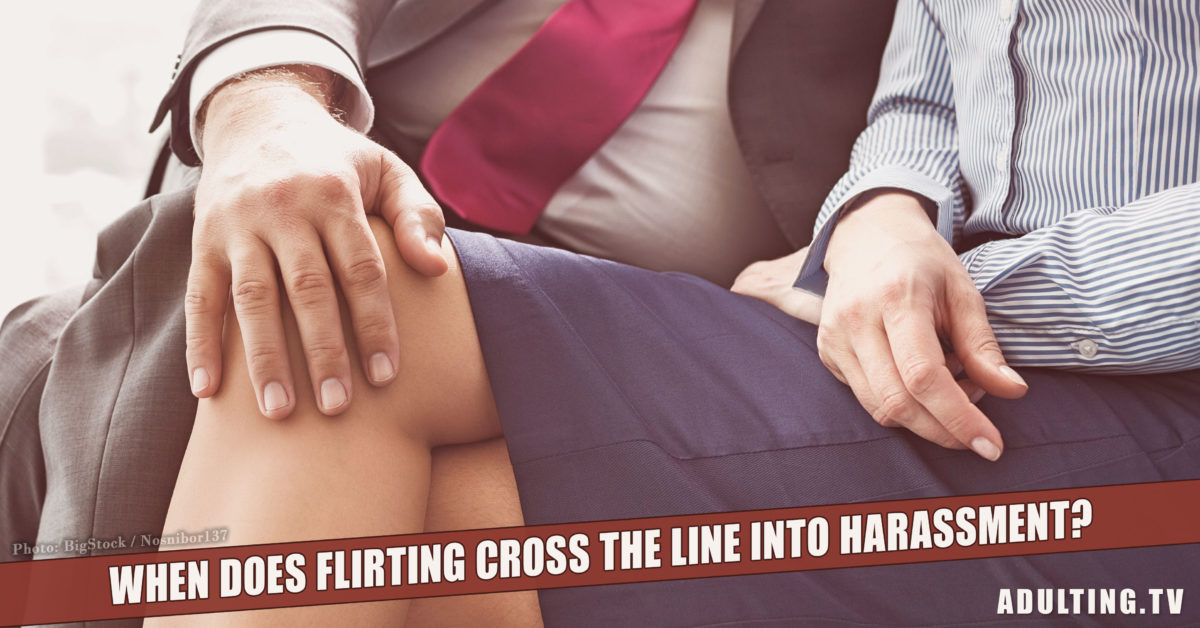With the recent upswell of sexual harassment allegations both in Hollywood and Washington, victims of sexual abuse are starting to come out of their shells. Sexual misconduct isn’t happening more often, but victims now feel emboldened to share their stories and name the people who have mistreated them.
But for every victim stepping forward, there are still plenty who remain silent – often because they don’t fully understand the line between harassment and flirting. Sexual misconduct has always been vaguely defined by the masses, but that definition is starting to crystallize as the public turns to address the epidemic.
Like many women, I’ve experienced my fair share of sexual harassment, both in the workplace and elsewhere. Here’s where I draw the line.
What is the difference between flirting and sexual harassment?
The line between flirting and sexual harassment can seem hazy. What’s innocent and flirty to one person may be totally inappropriate to someone else. A kind smile can seem lewd to its recipient.
To me, the difference between flirting and sexual harassment is the frequency with which it occurs, as well as any escalation in the nature of the behavior. For example, telling me I’m pretty once is flirting – repeating it multiple times becomes sexual harassment. This is especially true if I’ve made it clear I have no interest in the other person.
When you view it that way, it’s easy to see the line between flirting and harassment. Men don’t have to worry about being accused of wrongdoing if they don’t continuously try to woo an obviously disinterested woman.
However, flirting can automatically become sexual harassment when it’s done by someone in a position of power. For example, I used to intern at a local magazine where the editor-in-chief had a reputation for pursuing the young interns. His actions were so widespread that multiple people warned me before I started working there.
Sure enough, a few weeks into the gig, the editor approached one of the interns and asked her out for a drink. She said no because she wasn’t 21 yet, and we tried to convince her to complain to HR about it.
“But he didn’t do anything bad,” she told us. “Maybe it was just going to be a friendly drink.”
At the time, I didn’t have the proper context for why an editor asking out an intern is problematic, but now I know. If you have authority over someone, treating them like a sexual object is always sketchy. They can’t say no without worrying about what it could do to their career.
The legal definition of sexual harassment.
According to the U.S. Equal Opportunity Employment Commission, sexual harassment not only includes sexual comments or physical advances, but also general statements about one particular sex. For example, if a male coworker complains that all women are golddiggers, that’s sexual harassment.
The EOEC says sexual harassment becomes illegal “when it is so frequent or severe that it creates a hostile or offensive work environment or when it results in an adverse employment decision (such as the victim being fired or demoted).”
Anyone can be a harasser, including a vendor, client, peer or boss. The harasser can be your same gender and have a similar or different sexual orientation from you. So yes ladies, you can be accused of sexual harassment just as much as men.
What you can do.
If you’re being sexually harassed in the workplace, the first step is to document everything. Successful cases are made when the accuser has details, such as where and when the harassment occurred and what exactly was said and done. It can also help to share what happened with people you know who can back you up.
After you’ve documented the instances of harassment, it’s time to go to your human resources department. Tell them you’d like to file a sexual harassment report and bring all the details with you. It’s even better if you have concrete proof, such as texts, emails or voicemails. The stronger your evidence, the more likely it is people will believe you and take action.
Don’t stop writing down what happens after the sexual harasser has stopped bothering you. It’s important to note what your company does in response, in case you want to sue them later on.
If you report sexual harassment to HR, you should know that many companies don’t punish people who are accused of sexual harassment. In fact, sometimes the person reporting it has to deal with blowback if the person blamed is popular or has significant clout in the office.
It’s also OK if you don’t feel like reporting it, just like my friend decided not to back in the day. Not every company has a strong history of defending accusers and reporting it can be more traumatizing than the initial interaction. Do what makes sense for you and your mental health.
What are your feelings or experiences on this timely topic? Let us know in the #Adulting Facebook community.






